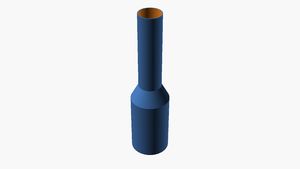Ferrules: Difference between revisions
From
| Line 34: | Line 34: | ||
* [https://en.wikipedia.org/wiki/Electric_wire_ferrule Electric wire ferrule (wikipedia)] | * [https://en.wikipedia.org/wiki/Electric_wire_ferrule Electric wire ferrule (wikipedia)] | ||
* [https://grabcad.com/library/single-insulated-wire-ferrules-1 Single insulated wire ferrules] | * [https://grabcad.com/library/single-insulated-wire-ferrules-1 Single insulated wire ferrules] | ||
* [[:File: | * [[:File:Automation_Direct_-_Wiring_Accessories_-_Single_Insulated_Wire_Ferrules.pdf|Automation Direct: Wiring Accessories - Single Insulated Wire Ferrules]] | ||
Latest revision as of 22:42, 23 October 2021
Part: Ferrules
| Designers: | Timothy Schmidt |
|---|---|
| Transformations: | Crimping |
| Tools: | 3D printers, Metal lathes, Crimping pliers |
| Parts: | Wires |
Introduction
An electric wire ferrule (sometimes electric end terminal) is a metal tube crimped over stranded wire to secure the strands within a screw terminal. Electrical insulation may be included to protect any exposed portion of the wire not completely inside the screw terminal post.
Stranded wire is preferred for most electrical applications because it is more reliable than solid wire. It is more flexible and durable because repeated bending will not cause it to break. Stranded wire can be more difficult to terminate, because the individual strands tend to separate after insulation is removed.
By placing the end of the stranded wire in a ferrule, the strands stay together.
Challenges
Approaches
- nickel plated steel, zinc plated steel, stainless steel tube
- 3D printed or injection molded housing
